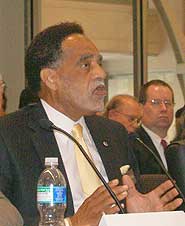APWU to PRC: ‘Burden of Proof’ Is on Those Pushing for Change
July 11, 2008

speaking at the Postal Regulatory Commission
hearing on universal service, July 10, 2008.
Because universal postal service is still extremely important to the fabric of American life, APWU President William Burrus said in a public hearing July 10, those who seek changes in the postal network or monopoly should provide unassailable reasons for doing so.
“Those who want to dismantle the Postal Service network or who call for changes in the postal monopoly,” Burrus said in testimony before the Postal Regulatory Commission, “should be required to bear a heavy burden of proof that there is a need for such change.”
The union president said that far too much of the discussion on postal service is from the big-business perspective. “View the questions of access to the mailbox and the need for universal service through the eyes of the average citizen,” he urged the commission. “If the need for postal services were to be viewed only from a business viewpoint, important access to services might be curtailed.”
Burrus noted that postal workers bring a unique perspective to questions about the need for universal service. “We are average Americans, residing in every community [and] we see and understand on a personal level how important our services are to individuals and to communities.”
Churches, community associations, and small businesses, as well as average citizens (who may be technologically challenged) are among the consumers that still depend heavily on postal services, he said.
The Postal Service’s obligations to these consumers, Burrus reminded postal commissioners, have been made plain to the PRC before. As Rep. John M. McHugh (NY) — one of the staunchest supports of postal reform legislation — recently testified:
“Congress debated the future of the Postal Service for 12 years and during that time a bipartisan consensus formed that held universal service should be broadly defined to serve all Americans, rich and poor, urban and rural, nationwide. That has historically meant six-day delivery, reasonable access to retail services as well as convenient access to collection boxes.”
Burrus added that McHugh strongly supports the postal monopoly and has referred to the mailbox monopoly as “crucial to America’s sense of privacy and the security of the mail.”
The APWU president asked the PRC to compel the Postal Service to proceed cautiously. “The Postal Service has shown a remarkable capacity to evolve and endure in response to changes in the postal marketplace. These changes include the near monopolization of overnight delivery of messages and of parcel delivery by Postal Service competitors, as well as the development of electronic transmissions.”
“The effect of the nation’s economic stagnation has caused a slow but steady erosion of First Class mail volume, but these developments only emphasize the importance of maintaining the monopoly to ensure that universal service can be sustained even in hard economic times.”
Under the Postal Accountability and Enhancement Act (PAEA), the PRC is required to prepare a report for Congress on universal postal services and on the obligation of the USPS to provide those services to the American public. The report is due in December.
Burrus noted that the APWU has been critical of the PRC’s approach to the study and the very short timetable for the selection of a consultant to assist in its preparation.
“I have shared our views in a letter to the House Subcommittee on Federal Workforce, Postal Service, and the District of Columbia,” he said. “We are concerned about the published opinions of the contractors.” The union also has objected to the PRC’s decision to select as contractors individuals well-known for their support of privatization of the Postal Service and for limitations on the postal monopoly.
Burrus told the PRC about contractors’ writings that characterize the monopoly as having “insidious effects” such as the corrosion of labor relations and the intimidation of customers. Writings have referred to the monopoly as “the chain that binds the Postal Service hand and foot” and say that it excuses endless political interference from members of Congress.
“I find these writings to be short on original analysis and long on ideological wishful thinking. I disagree that this is the time and universal service is the vehicle to tinker with the postal monopoly.” Burrus said.
“The basic function of the Postal Service is still the “obligation to provide postal services to bind the Nation together through the personal, educational, literary, and business correspondence of the people and is required by law to “provide prompt, reliable, and efficient services to patrons in all areas and [to provide] postal services to all communities.”



